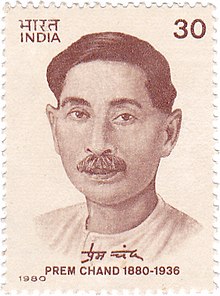Rangbhoomi: The Arena of Life[a] is a Hindi language novel by Premchand. The novel features an idealist protagonist inspired by Gandhian values.[1]
 Premchand, the author of Rangbhoomi | |
| Author | Munshi Premchand |
|---|---|
| Original title | Rangbhoomi |
| Country | India |
| Language | Hindi |
| Genre | Fiction |
| Published | 1924 |
| Publisher | Darul Ishat |
| Media type | Novel |
| ISBN | 9788122205329 |
Set in colonial India, the novel presents a grim account of a blind beggar, Soordas, against the acquisition of his ancestral land. The theme of the oppression of working classes is typical as in other Premchand works.[2] Among Premchand's works, Soordas is the character with the most significant Gandhian influence. He is simple and fearless, and personifies the protest against industrialisation in his village, consistent with the Gandhian views on industrialisation.[3]